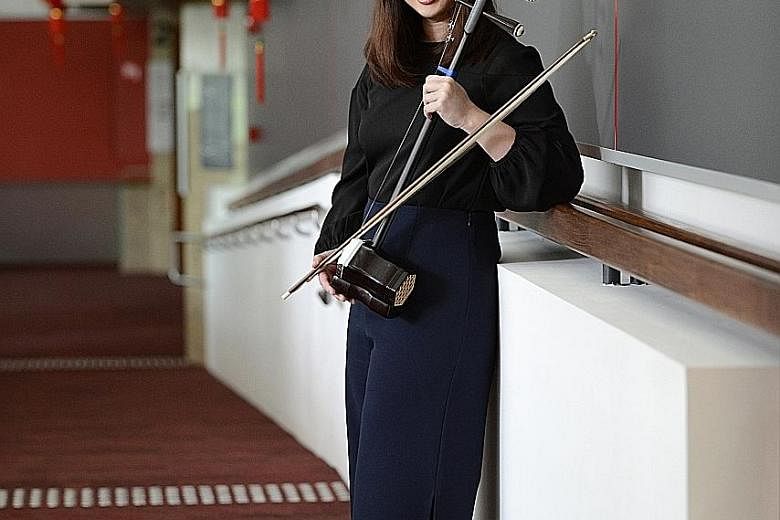The best antidote to stage fright, says erhu player Deborah Siok, 24, is to be over-prepared.
It was this mindset which got her through the Singapore Chinese Music Competition a fortnight ago, when her rousing performance of Wang Danhong's erhu concerto Amannisha won her the top prize of $10,000.
"When I rehearse, I think of every single detail that might possibly distract me on stage. The moment I found out we had to wear masks to perform, I started practising with my mask on," says the member of the Singapore National Youth Chinese Orchestra (SNYCO).
Breathing exercises and advice from her mentor - SCO's concertmaster Li Baoshun - also helped, even though she still felt nervous.
The biennial music contest, previously known as the National Chinese Music Competition, aims to develop the performing skills of young musicians and discover new talent.
It was the first time the contest was organised solely by the Singapore Chinese Orchestra (SCO) and had both local adjudicators present on site and overseas adjudicators tuning in via a live stream.
There were a total of 27 adjudicators, 18 local and nine overseas, judging for different categories and sections.
The 15-day competition, which ended on Dec 12, took place at the Singapore Conference Hall and had more than 330 contestants in solo and ensemble categories.
Siok had won first prize in the competition's erhu open category in 2018. This year, she pipped erhu player Li Siyu, 19, and guzheng player Fu Zifei, 20, to the top award in the solo grand category.
Siok's interest in music began at an early age. The Nanyang Academy of Fine Arts graduate recalls watching the 12 Girls Band play at the Singapore Indoor Stadium in 2004. Her father was a fan of the Chinese group, who juxtapose sounds of erhu, pipa, yangqin and guzheng with Western pop.
The budding musician, who then played only the piano, was fascinated. In Primary 3, she picked up the erhu in her school's Chinese orchestra. Private lessons with erhu master Zhang Yu Ming followed.
Today, Siok - who also has a Grade 8 in piano - is a part-time erhu teacher. She plans to save most of her prize money, but might also add a new erhu to her collection of Chinese bowed string instruments. She has about 20 erhu, gaohu and zhonghu.
She also hopes people's perceptions of Chinese music - and the idea that being a musician is not a viable career - will change.
She says: "There is public perception that music is not a profitable route... Hopefully, more young people will pursue music and keep this tradition alive."
Siok, the youngest of three children, is the only musician in her family. Her father works in the construction industry and her mother is a secondary school teacher. Both are supportive of her choice of career.
Joining the SCO would be the "ultimate dream", she says, adding that she will be applying to do a master's at Beijing's Central Conservatory of Music.
Music has enriched her life.
"It has taught me discipline, to be a better listener and to be humble. You cannot be complacent or arrogant when you learn an instrument."
• Watch her play at str.sg/JRTR


